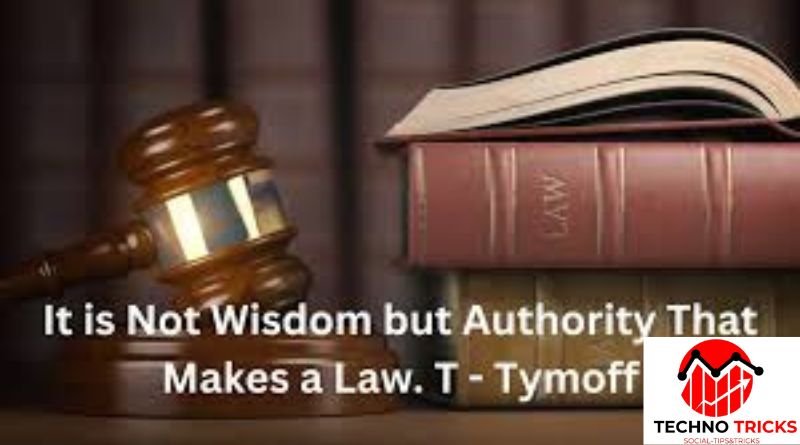It Is Not Wisdom But Authority That Makes A Law. T – Tymoff
The phrase “It Is Not Wisdom But Authority That Makes A Law” by T – Tymoff presents a thought-provoking perspective on the nature of law, power, and governance. This statement challenges conventional ideas about the role of wisdom in the creation and enforcement of laws, focusing instead on the central role of authority. Laws are often seen as a reflection of wisdom, established to ensure justice and order within a society. However, Tymoff’s quote directs attention to the power structures that govern these laws, suggesting that authority, rather than wisdom, is the true force behind legal systems. This article will delve into this powerful idea, exploring the implications of authority in lawmaking, the dynamics between wisdom and authority, and how this philosophy applies to modern governance.
Understanding the Concept of Law
To better understand Tymoff’s quote, it is essential to first define what law is and the role it plays in society. Laws are the rules that govern the behavior of individuals within a community or society. They are designed to maintain order, protect rights, and ensure fairness. Traditionally, laws are believed to be based on principles of justice, morality, and, to an extent, wisdom. Wise individuals—often philosophers, scholars, or experienced leaders—have historically been tasked with creating laws that reflect societal values.
However, the idea of law as a reflection of wisdom can be challenged. Laws are not always created with universal wisdom in mind, nor do they always uphold the ideals of justice and fairness. Instead, they are often shaped by those in positions of power, whose authority enables them to impose their will on society. In this context, Tymoff’s assertion becomes clearer: it is not the wisdom of those who create laws that shapes them, but rather the authority of those in power.
The Role of Authority in Lawmaking
Authority, in its simplest form, refers to the power or right to give orders, make decisions, and enforce obedience. Authority figures include government officials, lawmakers, judges, and even powerful corporations or organizations. These individuals or entities possess the legal or institutional power to create, enforce, and interpret laws, often with limited input from the general public.
Tymoff’s statement highlights a critical aspect of lawmaking: the authority to make laws does not always come from wisdom or moral clarity but from the position of power held by the lawmaker. This authority is often what drives the creation of laws, as those in power enact legislation that serves their interests or the interests of the groups they represent. In many instances, laws are crafted based on political agendas, economic considerations, or the need to maintain control over a population.
It is important to recognize that authority does not automatically equate to fairness or justice. In some cases, laws may be oppressive, discriminatory, or unjust, but they are still enforced because they hold the weight of authority behind them. This illustrates the tension between wisdom and authority in lawmaking, as laws are not always driven by the noblest or most just of motivations.
Wisdom vs. Authority: A Complex Relationship
While authority plays a pivotal role in lawmaking, the relationship between wisdom and authority is complex. Wisdom is often associated with knowledge, experience, and sound judgment. It implies an understanding of what is right and just, based on a deep appreciation of human nature and societal needs. Ideally, lawmakers should use wisdom to guide their decisions, creating laws that promote justice, equality, and the common good.
However, in reality, wisdom does not always align with the actions of those in power. Political leaders, for instance, may prioritize maintaining their power or the status quo over pursuing wisdom or fairness. This can lead to laws that benefit a select few while leaving the broader population marginalized. The pursuit of wisdom can be difficult when power structures are entrenched, and those with authority may not always have the foresight or impartiality to enact wise laws.
The relationship between wisdom and authority can also be seen in how laws are interpreted and applied. Judges, who are tasked with interpreting laws, often bring their own biases and experiences into their decisions. Their interpretations of the law may reflect wisdom or a lack thereof, depending on their understanding of justice and fairness. Ultimately, the authority of the judicial system gives the final say in how laws are enforced, regardless of the wisdom behind them.
The Influence of Authority in Modern Governance
In modern societies, the role of authority in lawmaking is undeniable. Legislators, political leaders, and influential organizations hold significant sway over the creation and enforcement of laws. This concentration of power can have a profound impact on the legal landscape, as those in authority shape the laws that govern everything from civil rights to business practices.
One key example of the influence of authority in modern governance is the role of lobbying and corporate influence on legislation. Powerful corporations often use their financial resources and political connections to influence lawmakers and shape policies that benefit their interests. These laws may not necessarily be based on wisdom or the needs of the general public, but rather on the desires of those with the most authority and influence.
Similarly, in authoritarian regimes, laws are often imposed without regard for public opinion or wisdom. In these systems, authority is concentrated in the hands of a single ruler or a small group of elites, and laws are created to maintain control and suppress dissent. The lack of democratic processes means that the wisdom of the people is often sidelined in favor of the will of those in power.
How Tymoff’s Perspective Applies Today
Tymoff’s view that “It Is Not Wisdom But Authority That Makes A Law” is still highly relevant in today’s world. In many democratic societies, laws are created through processes that involve debate, public input, and checks and balances. However, the influence of authority is still strong. Political leaders and parties often shape the legislative agenda according to their own interests, sometimes disregarding the wisdom or needs of the broader population.
For instance, during times of crisis, such as economic recessions or national emergencies, governments may pass laws that prioritize security or economic stability over individual freedoms or justice. In these situations, authority takes precedence over wisdom, as leaders act quickly to maintain control or address immediate concerns.
Tymoff’s quote also speaks to the importance of questioning authority and the laws that come from it. While laws are often accepted as legitimate because of the authority behind them, they are not always just or fair. It is the responsibility of citizens to critically assess the laws they live under and to challenge those that are harmful or unjust. In this sense, wisdom can be seen as the antidote to unchecked authority, as it provides the moral compass needed to resist oppressive laws and advocate for change.
Conclusion
“It Is Not Wisdom But Authority That Makes A Law,” as articulated by T – Tymoff, offers a profound reflection on the nature of law and governance. It reminds us that laws are not always a product of wisdom or justice but are often shaped by those in power who wield authority. This perspective encourages a critical examination of the laws that govern our lives and the systems of power that create them. While authority is necessary for the enforcement of laws, it is important to recognize that true wisdom and fairness should guide the lawmaking process. As individuals, it is crucial to remain vigilant and question the authority that shapes the laws we live by, ensuring that they are just and serve the common good.
Read also: check




